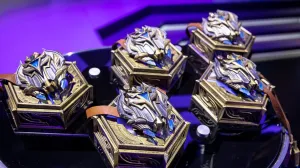Loot boxes have been a widely debated hot topic since they became available in many of our favorite games. Now the Entertainment Software Association (ESA) has announced that Nintendo, Sony, and Microsoft will be working on implementing new policies that will require games to disclose loot box odds on all of their various platforms. This comes after purchasable loot boxes that contain in-game items, currency, or skins have been called a form of “gambling” by some.
Now the ESA and the biggest developers want to start to regulate them, so gamers know exactly what the odds are of the particular loot box they are purchasing. ESA’s Michael Warneck made this news public during the FTC’s (Federal Trade Commission) Inside the Games Workshop. The ESA has made efforts to address the problem in the past. Some regulations included slapping labels on games informing consumers that the game contains loot boxes etc. The time frame for the big three to hopefully implement these new regulations is by the end of 2020.
Warneck also made the following statement explaining where these changes would occur:
Specifically, this would apply to new games and game updates that add loot box features. And it would require the disclosure of the relative rarity or probabilities of obtaining randomized virtual items in games that are available on their platforms.
Who else has done this and who isn’t
When reading about this new initiative, what surprised me was who was actively already doing this. For example, Apple back in 2017 made it compulsory for games on its iOS platforms to disclose loot box odds, and Google did the same thing this year. Activision Blizzard, Bandai Namco Entertainment, Bethesda, Bungie, Electronic Arts, Microsoft, Nintendo, Sony Interactive Entertainment, Take-Two Interactive, Ubisoft, Warner Bros. Interactive Entertainment, and Wizards of the Coast are now all saying they will commit to disclose odds to the ESA.
There are many big publishers still missing from this group, but there is time for them to reflect and still come around.
This news can only be good for consumers but possibly bad for publishers’ pockets. Time will tell.







